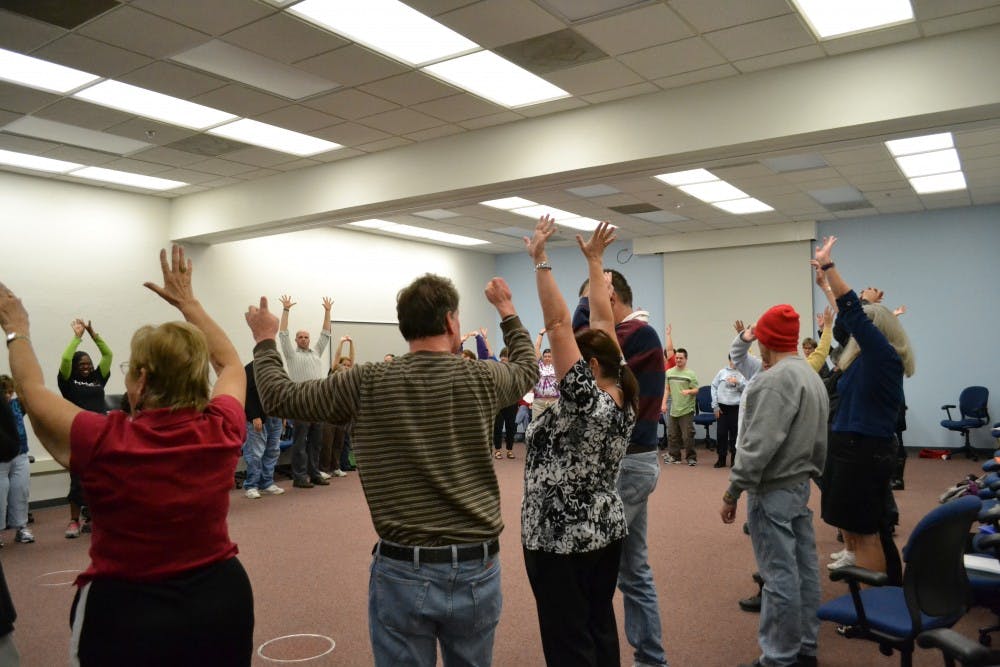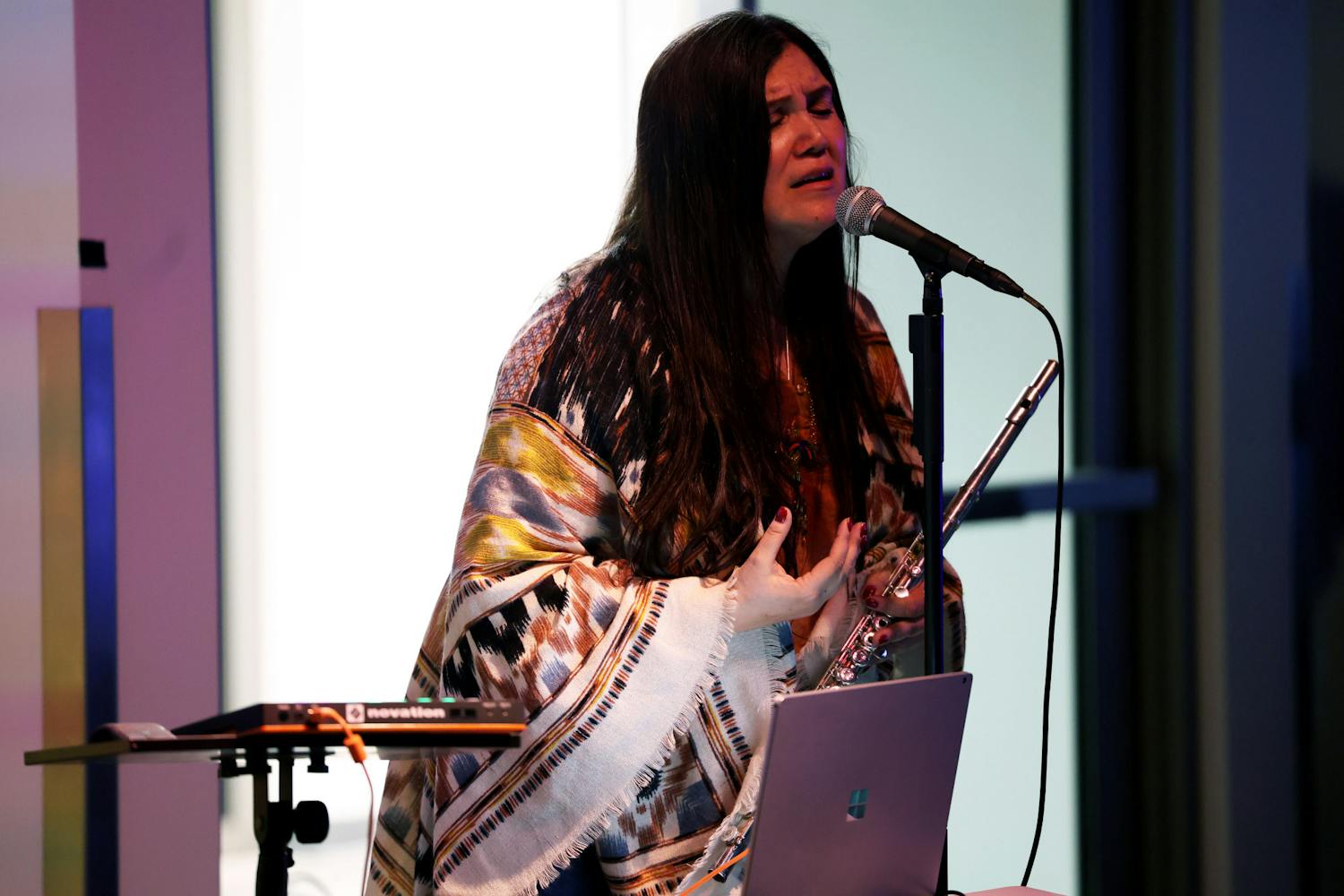 Converse shoes are a requirement of all members of Detour, providing members a chance to stand out as they choose the style and color of the shoe.
Converse shoes are a requirement of all members of Detour, providing members a chance to stand out as they choose the style and color of the shoe.Photo by Mackenzie McCreary
They begin in a circle, hands raised to the sky and stretched to the ground, they loosen up before letting their creative energy go — a critical moment of control in an otherwise happily chaotic rehearsal.
A large room of the Scottsdale Center for the Performing Arts accommodates the more than 45 people that make up Detour Company Theatre — a group of people with cognitive disabilities and a love for performance.
“This is not just a program, it is a theater company. The actors just happen to have disabilities,” says Joyce Lefco, president of the board of directors for Detour.
 Detour actors, coaches and producers stretch in Opening Circle before rehearsal begins. Other activities, including back rubs and voice exercises, help warm up the actors and singers.
Detour actors, coaches and producers stretch in Opening Circle before rehearsal begins. Other activities, including back rubs and voice exercises, help warm up the actors and singers.Photo by Mackenzie McCreary
Smiles fill this room where actors and actresses at heart are able to overcome the challenges they have faced since birth.
“To them, anger doesn’t have any more weight than being blind,” Sam, director of Detour, says. “Everyone’s just a person.”
A Life in Motion
ASU alumna Sam, whose last name was legally deleted by choice in court a number of years ago, founded Detour. Through the company, she aims to provide an opportunity for adults with cognitive disabilities to express themselves through theatre and performance.
“This is not therapy, but theater is always therapeutic,” Sam says. “I think everything in life should give the opportunity to people to experience success.”
Comprised of both these actors and their coaches, the company performs shows ranging from Broadway to Disney every winter and spring.
The idea for Detour grew out of Sam’s own experiences. Though born with a congenital dislocated hip, she was always moving. “I was making up little Cirque du Soleil shows myself,” she says with a laugh, her face lighting up with the memory.
“I was supposed to be one of those people that walked around with a profound limp,” she says. “But I was too stubborn and determined to dance, so that didn’t happen.”
As she continued to dance and teach, Sam realized she was strong enough to take care of herself, despite this small setback. And so she turned her efforts toward helping others realize their potentials as well.
When Sam’s son was in grade school he asked her, “So when is it going to be my turn?”
The realization that there were people similar to Sam still looking for their opportunity to succeed helped evolve the idea for Detour into reality.
“Most of these guys will never get married or have children or experience any of these rights of passage, so I make sure that this moment is just as full of magic because this is their moment to shine,” Sam says.
 Christine Clift acts as a cowboy, swinging an imaginary lasso around her head.
Christine Clift acts as a cowboy, swinging an imaginary lasso around her head.Photo by Mackenzie McCreary
Navigating the Differences
While the primary aim of Detour is to provide an authentic theater experience, small changes must be made in order to make it easier for the actors to perform their parts.
If an actor or actress cannot say their line three times, they adjust the line. If there is a scene where everyone needs to be facing a certain way, they refine the scene so that the girl who is blind looks like everyone else, Sam says.
The coordination of the performance must also be tweaked in order to accommodate actors who need assistance moving through the choreography.
In one rehearsal, Sam and her fellow producers coordinate the dream scene of their upcoming show “Oklahoma.” The women rush around in a string led by a woman in a power chair. All of them giggle at the silliness of the scene.
Another way the company secures the performance is by wearing Converse shoes, as they grip the stage floor well and provide stability for the actors with mobility issues.
“It also lets them be individual because they can choose what type and what color they get,” Sam says. “That’s sort of our thing.”
But while Detour remains an accepting base of creativity, several members confess to being the subject of discrimination and bullying outside of the stage family.
Sam’s grown son, Chris, told a story about a day at his work when someone else ate his food and he nearly cried.
But then that man called him stupid.
“I wasn’t going to take that for nothing,” he says. “I can go off very easily, I get furious and they have to take me out for a walk to calm me down.”
Others have been called retarded or not taken seriously.
“We talk about it a lot,” Sam says. “They’re very sensitive to it because it’s hard to find folks like them. Where are you going to find a date? How are you going to find someone to take you seriously?”
Stage-Family Strong
Despite these small “detours,” the company persists and works to ensure the success of the show. While most of the members came to Detour through friends, they all have their own reasons to stay.
Actress Jennifer Jenkins, who was born without retinas, says, “I like to sing more than I like to speak.”
 Sam makes a joke about the scene as she organizes the actors and actresses during the square-dance scene.
Sam makes a joke about the scene as she organizes the actors and actresses during the square-dance scene.Photo by Mackenzie McCreary
Leah Mapstead, an actress double-cast as Ado Annie in “Oklahoma,” says she enjoys everything from singing and dancing to memorizing lines.
Actor Taylor Ray says, “It’s just really cool to be a part of this family. This is my life, and this is great.”
Lefco says the energy in the company is always very high. “When something happens and they cheer for you, it’s just the warmest hug you could ever get,” she says.
Detour is a 501c3, not-for-profit, charitable organization and so the company relies on grants and donations, Lefco says.
Detour also does not charge admission for their shows. “Group homes would come but wouldn’t want to pay and so they would just sit outside and listen,” Sam says. “I would end up saying, ‘Just go in,’”
Sam says that the group just wants everyone to come and see them perform. As a poem by Mapstead encourages: “Come and see the amazing Thespian family of mine — come and see how bright we all shine.”
Every rehearsal and every show presents its own challenges, but Detour keeps moving forward.
“I think that all of them have something to offer this world and I think they know [that] and they’re proud of it,” Sam says. “They just love each other, they want a community — who doesn’t want a community?”
Detour’s showing of “Oklahoma” will debut on Jan. 11 at The Scottsdale Center for the Performing Arts, and the company remains optimistic about the result, even in their anxious last rehearsals.
Rehearsal ends with a closing circle as members recognize who had been a friend during rehearsal that night — a theme strong within the play “Oklahoma.”
Everyone is anxious to share.
“They’re all my family,” Sam says with tears of happiness welling in her eyes. “We have been through so many births and so many deaths. I am just so honored and grateful.”
Reach the writer at mamccrea@asu.edu or via Twitter @mackenziemicro




